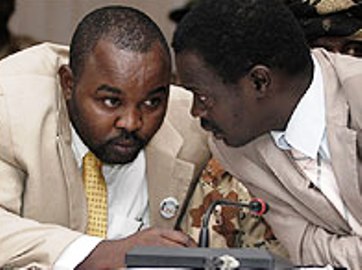Minnawi, al Nur reject agreement on transitional rule in Sudan
July 5, 2019 (KHARTOUM) – Two factions of the Sudan Liberation Movement, one led by Minni Minnawi (SLM-MM) and other led by Abdel Wahid al-Nur (SLM-AW) have rejected the agreement reached by the Forces for Freedom and Change (FFC) with the Transitional Military Council over the transitional authority.

The deal was seen as a delicate compromise establishing a partnership for three years between the military and the civilians ending the three-month standoff that started after the collapse of the al-Bashir’s regime on 11 April.
However, SLM-MM which a member of the opposition coalition issued a statement saying this agreement does not reflect the aspiration of the Sudanese or acknowledge the sacrifices made by the people.
The statement particularly criticized the absence of a six-month pre-transitional period they developed during secret meetings held in Abu Dhabi in April 2019 providing to set up a six-month government to negotiate peace with the armed groups and then after the conclusion of a deal a transitional government be formed including rebel representatives.
“This approach, in which a government will be formed by some FFC factions who share authoritarian and racist ideas to preserve an old status with new names and personalities, will not lead to the establishment of the equal citizenship state that we call for and the Sudanese people gave the most precious sacrifices to achieve,” said the statement.
In a press conference held on Friday, FFC delegates vowed to work with their allies in the armed groups to settle the armed conflicts in Darfur, Blue Nile and South Kordofan.
Minni Minnawi who is also the chairman of the Sudanese Revolutionary Forces (SRF) recently called to allocate 35% of the transitional authority to the armed groups from the war-affected regions.
He also they decided to withdraw SRF representatives in the FFC negotiating team saying the latter “didn’t include in the agenda of negotiations the concerns of the war-affected areas in Darfur, Blue Nile and South Kordofan”.
Malik Agar the leader of one of the SPLM-N factions called on the African Union support a meeting for the FFC groups to forge a unified vision on the transitional period.
“The unity of the components of the Forces for Freedom and Change, including the forces of the armed struggle, is of strategic importance for the full implementation of the program of the transitional period,” Agar said.
BETRAYAL OF THE REVOLUTION
For its part, the SLM-AW which is not part the FFC said the agreement was a betrayal of the revolution.
“The agreement signed on Friday morning, 5 July 2019 between the military junta and the so-called Forces for Freedom and Change is a betrayal of the revolution and the blood of the martyrs who gave their lives for freedom, dignity, comprehensive change, full civilian rule, and the establishment of an equal citizenship state”
The rebel group further pledged to resist the armed stressing they consider it as an extension of the former regime “with all its distortions, failures and crimes”.
“We call upon all the great Sudanese people in the east, west, south and north, and young women and youth to continue the resistance and not to despair, be frustrated or surrender because the path of freedom, dignity and change is fraught with danger, opportunists and thieves of revolutions,” said the statement.
The SLM-AW refused in the past to take part in the peace process with the government of President Omer al-Bashir after the failure of Abuja peace talks in May 2006.
(ST)
